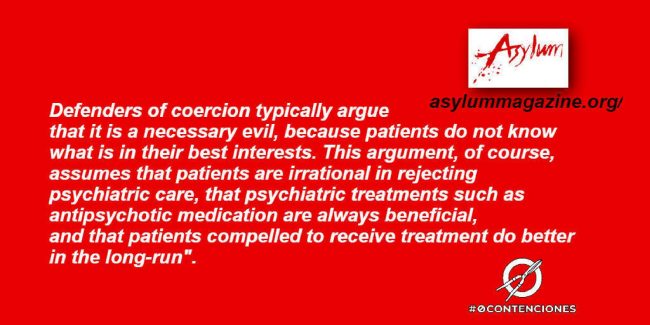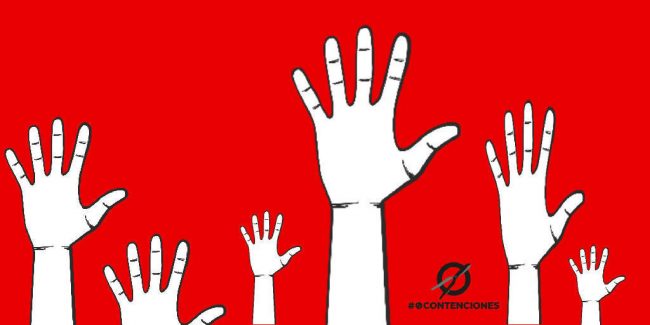#0Contenciones (zero restraints) is a campaign to end the practice of physical restraint in Spanish psychiatric facilities.
Physical restraint consists in tying a person to a bed with straps across the waist, on the wrists and ankles, to impede moving freely. The person may be tied up for hours or even days, depending on the decisions of hospital staff. It causes suffering, trauma and even death. Physical restraint in Spain is unregulated and often covered up. It is not possible to access files explaining who is restrained, by whom, why and for how long, and least of all – how. This means instances of serious injuries and fatalities go unpunished.

Locomún, an active mental health collective, initiated this campaign.
Their objective is to mobilise people and provide information and campaign materials.
0Contenciones.org
Here is what they say:
Why physical restraint? In theory, we are strapped down as an extreme measure to prevent us from hurting ourselves and / or others. In reality, we are strapped down when staff are frightened and do not know how to deal with us, when they do not understand what we are asking for, or when they cannot tolerate our level of distress. Or it may be to punish us if we break a hospital rule. These decisions are based on power, control and fear, and have nothing to do with therapy.
There is a widely held prejudice that marks crazy people as aggressive, irrational and unpredictable. There is substantial evidence that mad people are not more violent than the rest of the population, and that, in fact, we are more likely to be victims of violence than perpetrators. Physical restraint saves having to face the other person as a human being and be moved by the connection. It is often argued that physical restraint is used due to “lack of resources”. Yet physical restraint costs money, money that could be used to develop more humane alternatives to being strapped down.

What are the consequences of physical restraint? Physical restraint can cause bruises, fractures, muscle atrophy, coma, asphyxia by aspiration, skin and respiratory problems, hypercatabolic states that weaken the respiratory muscles, dehydration, incontinence, self-injury and death. Despite attempts to cover up deaths inflicted by this practice in the State’s psychiatric units, in 2017 two deaths caused by physical restraint were reported in the media.
On a psychological and human level, being strapped down wounds our dignity in a way that is often incurable. It damages our emotions, our disposition towards ourselves and towards others. Not only is it not therapeutic (and the thought that it could be is, without a doubt, the greatest madness), but it also undermines any previous therapy that we have done and destroys any trust we may have had in the mental health system. It adds to our suffering and trauma, and takes us even longer, if ever, to recover.
What do the United Nations and the World Health Organization say about this? The UN has stated that immobilizing people “with psychosocial disabilities”, even for a short period of time, can amount to torture and mistreatment. They have said physical restraint is the result of systemic failure to protect the rights of individuals. The World Health Organization affirms that these practices are never justified, even in extreme circumstances.
Are there alternatives? There are always alternatives to tying up another human being and places which have eliminated the practice clearly demonstrate this: Iceland, United Kingdom, Mendrisio (Switzerland) or Trieste and Modena (Italy). Alternatives like listening to us, giving us a hug if we need it, reassuring us with words or gestures, stay nearby or let us calm down alone in a quiet environment where we feel safe. Accompany us in our crisis until it passes. In extreme cases physical restraint can be done with the body (provided it is done in a respectful way), never with straps, and always for the shortest possible time.
We also want to draw attention to the practice of so-called “chemical restraint” where straps are replaced with high doses of sedative drugs that paralyze our bodies and our minds, putting our health and our lives at serious risk. The use of a medication that is not part of the person’s usual treatment, to limit their movement or control their behaviour, is not a reasonable alternative.
What do we want? We would like responsible parties in psychiatric facilities to refuse to restrain patients. But we also demand regulations prohibiting the use of all forms of restraint. We demand an end to impunity in the cases where injury of any kind was been caused by physical restraint. We want this practice abolished and sent to the garbage dump of history.

We call on readers and supporters of Asylum magazine to support our campaign —
E-mail: [email protected]
Website: 0Contenciones.org
